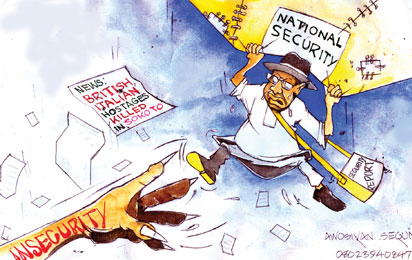
By John Amoda
HE noted that of the three amalgamation of the British colonial government, India, Sudan and Nigeria, only Nigeria stands at present… “We can’t ignore these facts. We can’t take these facts for granted. We either sit down and talk on them or we will wish them away as our leaders are trying to make us believe”.
Prof. Ango Abdullahi provides an explanation for the present state of affairs, especially the agitation for the break-up of Nigeria and a policy for responding to the agitation. The crises in the polity, Ango Abdullahi explains, is the result of bad governance and corrupt government. He proposes a conference for dealing with these two issues.
The first observation we make on Prof. Abdullahi’s thesis is that agitation for the break-up of Nigeria cannot be explained by bad governance and corrupt governments. He must first explain why electoral democracy results in bad governance and the enthronement of corrupt governments.
He must explain why elections are ineffective for removing corrupt office holders and establishing governments responsible to the Nigerian voting electorates. He must, in addition, explain how the break-up of Nigeria has become the remedy for bad governance and corrupt government. Finally, he must explain the relationship between movement for secession and bad governance and corrupt leadership. Is the Prof. explaining the separatist movements of Scotland and Catholic Ireland as a function of his two variables of bad governance and corrupt governments? Is he saying these two variables explain the dissolution of British India and Sudan? Obviously arguments by analogies beg the question.
General Useni’s explanation is both cryptic and economical. He says negotiation is what is needed. “If our brothers say today there should be security, there will be security. How can we say we don’t know those who are Boko Haram and yet they are killing us every day? The problem is the people they should go and meet; they are not going there”. The General amplifies the call for negotiation between the Boko Haram and the Federal Government. The General, it must be assumed, appreciates the implications of this insistence on negotiation. The first is that negotiation means that the Federal Government admits that it recognises the Boko Haram as a political equal, and accepts that its conflict with the sect shall be resolved through political means.
The second implication is that government admits the legitimacy of the Boko Haram views on how government and Nigeria are to be reconstituted to accommodate the political interests of the Boko Haram. Negotiations among parties at war are always carried on where neither party has been defeated and the parties are in war condition of stalemate. Does General Useni want to buy security at the expense of the reduction of the Federal Government to a party in conflict and the Boko Haram as an equal party in the conflict?
El Rufai’s conclusion in the Lead City University 2012 annual May Day lecture is a statement providing a perspective on General Danjuma’s portrayal of the security condition of Nigeria. We quote Ola Ajayi’s report in the Vanguard, Wednesday, May 2, 2012. Ajayi reports in the following:
Former Minister of Federal Capital Territory, Mallam Nasir El-Rufai, yesterday, warned the Federal Government to review its stance on the security situation in the country, but if it fails, ‘they will not be in government for too long’. He also disabuses the minds of many Nigerian that the insurgence of the sect was the handiwork of some Northern leaders to make the nation ungovernable for President Goodluck Jonathan. The ex-Minister who was the guest speaker at the Lead City University spoke on the topic entitled: “Between Terrorism And Corruption: Implications for Nigeria”, ruled out the use of force to silence the aggrieved sect. El Rufai said: “There is nowhere insurgencies like Boko Haram have been defeated purely through military force and occupation. Those who are saying ‘crush them’ should know that recent history of the war on terror is not on their side. We want a country that works for everyone, and this senseless loss of lives must end soon. The government that has the responsibility for our security must bend over backwards to deliver it. If they continue to fail in this regard, they will not be in government for too long”.
The core issue addressed by El-Rufai is on the policy the Federal Government should adopt in responding to the Boko Haram insurgency. He argues for a mix of instruments, military and “trade-ables”. Nowhere in El-Rufai is there a suggestion that the Boko Haram should lay down its arms as a precondition to any negotiation. He lays the full burden of peace on the Federal Government who must bend over backwards to accommodate the insurgent sect. He provides an explanation for the current situation inferentially in his plea- “we want a country that works for everyone”. It must therefore be asked- Are the Boko Haram taking up arms because they want a country that works for everyone? How far should government bend backwards before “this senseless loss of lives must end soon”. The aggrieved in this insurgency is also the aggressor. Has there been any case of insurgency where the terms of peace are imposed by an armed insurgent group? It is our conclusion that government can find no safe way of securing the country from the explanations on review. Yet the urgency of the crises cannot but be acknowledged. General Danjuma and El-Rufai have described the situation that call for strategic review of the Nigerian security situation by the Federal Government and the warning should be heeded that failure to do so carries the cost of “not being in government for too long”.
Disclaimer
Comments expressed here do not reflect the opinions of Vanguard newspapers or any employee thereof.